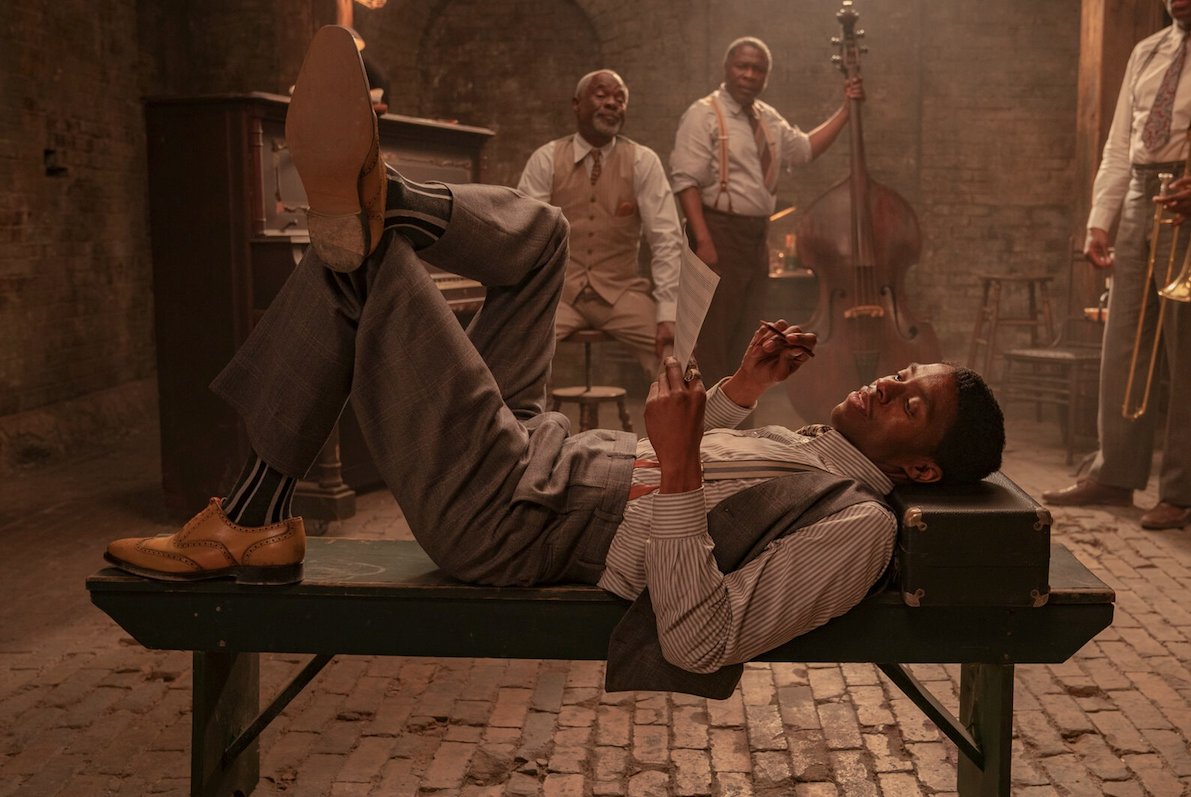What to Watch Verdict
Viola Davis and Chadwick Boseman deliver powerhouse performances as tortured, talented musicians whose paths cross at pivotal moments in their respective careers.
Pros
- +
🎺 Boseman's febrile energy as an ambitious trumpeter gives way to some profound, poignant revelations about the pain that drives his ambition.
- +
🎺 Davis' unhurried authority in the title role reiterates her gifts as one of this generation's greatest actresses.
- +
🎺 Director George Wolfe gathers a talented ensemble and brings their characters' conflicts to life with crackling energy.
Cons
- -
🎺 As a stage adaptation, Wolfe's approach doesn't quite give enough life to the world outside of the studio.
- -
🎺 Some of the movie's big moments emerge from jarring transitions - and recede just the same.
Chadwick Boseman makes his final film appearance in Ma Rainey’s Black Bottom, and it’s a reminder of how profound a loss his absence will be from the silver screen. But August Wilson’s 1982 play already served the purpose of reminding audiences about the value of black lives, and the cost when they are marginalized, excluded or snuffed out. George C. Wolfe’s new adaptation arrives at the same time as Regina King’s One Night in Miami, which deals with similar themes at a different (real) moment in history, and also struggles to find the right balance between fidelity to its source material and a story that on screen cannot help feeling contained. But bolstered by mesmerizing performances not only by Boseman, but Viola Davis as the 1920s chart-topper of the title, Ma Rainey’s Black Bottom offers an incredibly powerful referendum on the identity and autonomy of black men and women throughout history, and their ongoing struggle to endure in a system too preoccupied with what they accomplish to recognize exactly what they are.
Viola Davis (Widows) plays Ma Rainey, the legendary “Mother of the Blues.” Summoned for a recording session at the Chicago studio of her white manager Irvin (Jeremy Shamos) and her producer, she takes her time arriving while her backing band, three senior session men and a hotheaded trumpeter named Levee (Boseman), arrives early to rehearse, and eventually to snipe at one another. Trombonist and de facto bandleader Cutler (Colman Domingo) butt heads over the arrangement of “Ma’s Black Bottom;” Levee wants a faster, more danceable version, while Cutler fights to keep the standard the same as always. But even with the support of Irvin, Levee’s insistence on changing the song collapses once Ma arrives to record — especially after she spots the fearless young musician flirting with her girlfriend Dussie Mae (Taylour Page).
Meanwhile, Ma has her own plans for the session, insisting that her nephew Sylvester (Dusan Brown) perform an introduction on the track despite a debilitating stutter. But as the afternoon winds on and the group encounters problems getting takes on wax — and getting on the same page — Levee trades wills not just with Cutler and pianist Toldeo (Glynn Turman), but Ma herself, while trying to stake a claim with Irvin and his producer Sturdyvant (Glenn Coyne) to record as a lead artist rather than a songwriter and backup man. Before long, tensions boil over as their collective goals clash with each other’s individual aspirations, threatening to ruin the session entirely before Ma’s songbook can be properly recorded for posterity — and profit.
Adapted for the screen by Ruben Santiago-Hudson (Selma), Wilson’s play already possessed all of the elements for great drama just in its characterizations, with Levee’s restless ambition on one end, Ma’s resolute authority on the other, and the rest of the characters jockeying for position between those two extremes. The pretense of the recording session, and the pressure of Ma’s boss Irvin, feels almost superfluous to the conflicts that explode when these characters get into a room together, especially with Levee and Ma as two artists that are perfect opposites both in position and disposition. Lumbering around the studio in house shoes bellowing for a coke before she begins singing, Ma is the group’s 600-pound elephant, and Levee would be wise to stay clear, much less tempt fate by trying to woo Dussie Mae. But the young man’s frenetic energy and his irrepressible determination, even against his own better instincts, instigates conflicts almost before anyone realizes they’re in the middle of them.
But what’s interesting is that the movie isn’t really “about” the conflict that emerges between Levee and Ma, but between these black artists and individuals and the white-controlled world around them. Levee loses his temper, devastatingly, when his fellow musicians jibe him about kowtowing to Sturdyvant for a chance to write his own songs, but he’s also in the very beginning of his career, without the success or gravitas that Ma wields like a sledgehammer over the two white men that she recognizes only care about getting her art onto their records. But she becomes blustery and antagonistic as a reminder of the power she already wields, while Levee does it as a manifestation of his resentment that he doesn’t possess enough of it yet. If the tragic family history he reveals to his fellow musicians doesn’t entitle him to rub a few people the wrong way while achieving his goals, he’s decided that’s just too bad — albeit without realizing what it may ultimately cost him.
Boseman’s performance offers a study in coiled rage — the fury and resentment of being dismissed, oppressed and abused because of the color of one’s skin focused behind the sharp point of artistic talent that Levee is determined will carry him to success, and eventually, the opportunity to tell condescending white people what he really thinks of them like Ma does. Boseman carries the character’s pain deep in his portrayal, letting it bubble even in moments of casual banter between colleagues, and personifying the righteous anger of generations of black men whose potential was exploited or snuffed out — leading to eventual self-destruction. Meanwhile as Ma, sweaty and shiny beneath smudged grease paint applied as an armor against a world constantly trying to steal what’s hers, Davis is a force of nature, throwing her weight around literally but also conveying the rare and thrilling authority of a black woman who knows what she’s worth — and more importantly, know what she’s worth to white people — and isn’t afraid to use that to her advantage.
Wolfe’s direction faithfully captures the time and place of 1920s Chicago, but he doesn’t quite give nearly as much life to the world around the studio as he does to the one inside it. Branford Marsalis’ vibrant score provides a thriving backbeat for the escalating tensions of the day, but his jazzy interludes on the streets of Chicago only underscore the static isolation of the events going on behind closed doors. But that’s also the point of the juxtaposition: out there, streets where black men and women can walk freely and explore their dreams, and in Irvin and Sturdivant’s lair, one where the rules for black people remain depressingly the same as they have for centuries, and were written by whites. And unless you can gain an upper hand like Ma, those world remain distantly out of touch for one another.
Whether or not Boseman receives any sort of awards recognition for his performance, it’s undeniably a crowning achievement on a career that was way too brief, but already brimming over with highlights. Not one but two monologues he delivers stir heartbreaking emotions, touch on deep and seldom-explored nuances in black lives, and rank among the year’s most powerful cinematic moments. But it is significant that for his final film, the gifted actor tells a story about black identity, and about black men and women reclaiming control despite outside rules and pressures that seek to decide who they are, what they do, and what happens to those contributions. Ultimately, as both a story and a tragic historical footnote, Ma Rainey’s Black Bottom relays experiences that are both enduring and deserving of an overdue spotlight, communicating important truths about black identity in a timeline too often defined by whiteness — and as a result, forged as often through loss as achievement.
Todd Gilchrist is a Los Angeles-based film critic and entertainment journalist with more than 20 years’ experience for dozens of print and online outlets, including Variety, The Hollywood Reporter, Entertainment Weekly and Fangoria. An obsessive soundtrack collector, sneaker aficionado and member of the Los Angeles Film Critics Association, Todd currently lives in Silverlake, California with his amazing wife Julie, two cats Beatrix and Biscuit, and several thousand books, vinyl records and Blu-rays.












